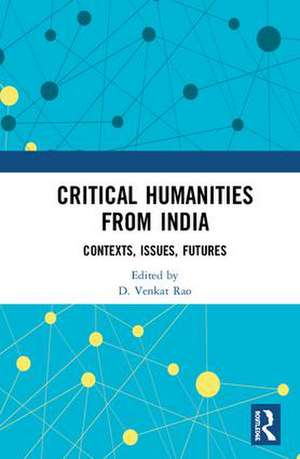Critical Humanities from India: Contexts, Issues, Futures
Editat de D. Venkat Raoen Limba Engleză Hardback – 13 mar 2018
Topical and timely, this book will be useful to scholars, researchers and teachers of cultural theory, literary studies, philosophy, cultural geography, legal studies, sociology, history, performance studies, environmental studies, caste and communalism studies, postcolonial theory, India studies, and education.
| Toate formatele și edițiile | Preț | Express |
|---|---|---|
| Paperback (1) | 386.22 lei 6-8 săpt. | |
| Taylor & Francis – 18 dec 2020 | 386.22 lei 6-8 săpt. | |
| Hardback (1) | 1000.27 lei 6-8 săpt. | |
| Taylor & Francis – 13 mar 2018 | 1000.27 lei 6-8 săpt. |
Preț: 1000.27 lei
Preț vechi: 1219.84 lei
-18% Nou
Puncte Express: 1500
Preț estimativ în valută:
191.43€ • 199.11$ • 158.03£
191.43€ • 199.11$ • 158.03£
Carte tipărită la comandă
Livrare economică 15-29 aprilie
Preluare comenzi: 021 569.72.76
Specificații
ISBN-13: 9781138743045
ISBN-10: 1138743046
Pagini: 320
Ilustrații: 20
Dimensiuni: 138 x 216 x 19 mm
Greutate: 0.45 kg
Ediția:1
Editura: Taylor & Francis
Colecția Routledge India
Locul publicării:Oxford, United Kingdom
ISBN-10: 1138743046
Pagini: 320
Ilustrații: 20
Dimensiuni: 138 x 216 x 19 mm
Greutate: 0.45 kg
Ediția:1
Editura: Taylor & Francis
Colecția Routledge India
Locul publicării:Oxford, United Kingdom
Public țintă
PostgraduateCuprins
List of Figures. Foreword. Contributors. Acknowledgements. Introduction: Crossing (the) Legacies 1. Education and Structures of Moral Formation: The Limits of Liberal Education in India 2. In-discipline(s): Diversity, Disciplinarity and the Humanities 3. Sites of Learning and Intellectual Parasitism: The Case for New Humanities 4. Why Communalism is an Indian problem: The Relationship between Communalism and Hinduism in Colonial Discourse 5. Sacerdotal Violence and the Caste System: The Long Shadow of Christian-Orientalism 6. Caste as an Impediment in the Journey of a Bhakta: Lingayat Vachanas, Jati and Adhyatma 7. River Literacy and the Challenge of a Rain Terrain 8. Accents of Memory: Critical Humanities and the Question of Inheritance 9. Indian Culture and its Social Security System 10. The Politics of Knowledge, Here and Now: A Conversation with Ashis Nandy. Glossary. Index
Notă biografică
D. Venkat Rao is Professor of English Literature, School of English Literary Studies, The English and Foreign Languages University, Hyderabad, India. In addition to books in English and Telugu, he has published several articles in national and international journals. His recent work is Cultures of Memory in South Asia (2014). His other publications include In Citations: Readings in Area Studies of Culture (1999), a translation of Ashis Nandy’s The Intimate Enemy into Telugu. He has also translated into English, a Telugu intellectual autobiography entitled The Last Brahmin (2012). He has co-edited Reflections on Literature, Criticism and Theory (2004) and an anthology of essays on U. R. Ananthamurthy’s Samskara. His interests include literary and cultural studies, image studies, comparative thought, translation, and mnemocultures. He has designed several courses interfacing culture, technology, and literary studies.
Recenzii
‘Critical Humanities from India opens up new avenues for comparative research in the human sciences. The prospect that it uncovers is a daunting one, exciting and important. This volume is destined to become a forerunner in a burgeoning scholarly field.'
Jürgen Pieters, Professor, Ghent University, Belgium
‘Seventy years after Indian political independence, a contemporary academic generation still faces the problems of radical intellectual emancipation. Not just consolidating versions of a post- or anti-colonial problematic or combating a still pervasive orientalism. But risking the recognition that the most difficult tasks of thinking disturbingly arise when the very concepts and terms with which one tries to think are themselves the problem. Whether questioning definitions of 'discipline', rethinking 'community', challenging the notion of 'caste', shifting 'geo-graphical' categories, or reconceptualising 'religion', this collection of essays contributes to the construction of an emerging 'critical humanities' for an Indian university terrain now potentially shaped as much by its pan-Asian student intake as by still dominant 'European' paradigms of how to think at all. A demanding but exhilarating collaborative undertaking by an impressive array of actively critical practitioners.’
Bernard Sharratt, Honorary Senior Research Fellow, University of Kent, UK
Jürgen Pieters, Professor, Ghent University, Belgium
‘Seventy years after Indian political independence, a contemporary academic generation still faces the problems of radical intellectual emancipation. Not just consolidating versions of a post- or anti-colonial problematic or combating a still pervasive orientalism. But risking the recognition that the most difficult tasks of thinking disturbingly arise when the very concepts and terms with which one tries to think are themselves the problem. Whether questioning definitions of 'discipline', rethinking 'community', challenging the notion of 'caste', shifting 'geo-graphical' categories, or reconceptualising 'religion', this collection of essays contributes to the construction of an emerging 'critical humanities' for an Indian university terrain now potentially shaped as much by its pan-Asian student intake as by still dominant 'European' paradigms of how to think at all. A demanding but exhilarating collaborative undertaking by an impressive array of actively critical practitioners.’
Bernard Sharratt, Honorary Senior Research Fellow, University of Kent, UK
Descriere
The field of humanities generates a discourse that traditionally addressed the questions of what is proper to man, rights of man, crimes against humanity, human creativity and action, human reflection and performance, human utterance and artefact. The university as a philosophical-political institution transmits this humanist account. This volume unravels the ‘barely secularized heritage’ of Europe (Derrida’s phrase) and its fatal consequences in other cultures. The task of Critical Humanities is to explore the ways in which the question of being human (along with non-human others) today from heterogeneous cultural ‘backgrounds’ can be undertaken.
